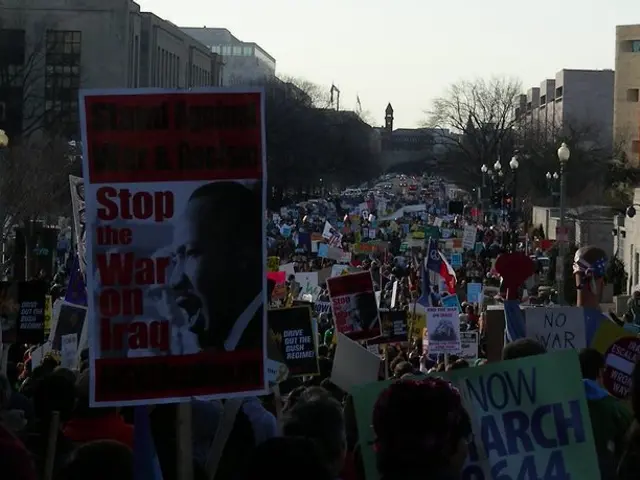"Assessment: Is the signed peace accord in Karabakh indicative of a fresh era in the ongoing conflict?"
In a significant development, the leaders of Azerbaijan and Armenia have initialled a peace deal in Washington. This milestone marks an important step towards ending the decades-long conflict between the two nations.
Ilham Aliyev, the President of Azerbaijan, has maintained his stance that Karabakh is an inseparable part of Azerbaijan throughout the peace process. Despite this, Baku presented a draft peace agreement in 2022, seen as an indication of Aliyev's approach to compromise. In a notable shift, Aliyev agreed to a new communication route, the "Trump Route," in the Washington meeting, abandoning his long-held insistence on a model of the Zangezur corridor under Russian control.
On the Armenian side, Prime Minister Nikol Pashinyan initially framed the Karabakh issue as a "confrontation between democracy and authoritarianism." However, after the 44-day war in 2020 that radically altered the balance in the region, Pashinyan's rhetoric changed sharply. He admitted that the idea of Karabakh's independence was not realistic. Pashinyan also recognized Azerbaijan's territorial integrity and told Armenian society that the choice between "Historical Armenia" and "Real Armenia" was unavoidable.
The Khazar Research and Analysis Center has analysed the role of both leaders in the Karabakh conflict. Over the past five years, Pashinyan has been forced to make compromises, while Aliyev has demonstrated openness to compromise on international platforms, despite using harsh and militaristic rhetoric domestically.
Armenia's government, under Pashinyan, has sought to diversify its security policy by strengthening ties with Western countries through increased diplomatic engagement, participation in international organizations, and pursuing reforms aimed at greater cooperation with the EU and NATO, while maintaining relations with Russia.
The peace deal is described as a crucial step towards resolving the Karabakh conflict. However, the main question remains whether it will lead to a lasting peace in the region. Peace in the region depends not only on documents, but also on political will, public support, and shifts in the geopolitical balance of the region.
Despite the initialling of the peace deal, the fate of peace will also depend on the nature of the political systems themselves. The future of democratic and authoritarian regimes in the region will play a significant role in maintaining and enforcing the peace agreement.
The document initialed in Washington on August 8 is assessed as the next stage in the long process of resolving the Karabakh conflict. The initialling of the peace deal reduces the likelihood of war, but the road to lasting peace is still long and fraught with challenges. Only time will tell if this peace deal will bring a lasting solution to the long-standing conflict in the Caucasus region.
Read also:
- United States tariffs pose a threat to India, necessitating the recruitment of adept negotiators or strategists, similar to those who had influenced Trump's decisions.
- Weekly happenings in the German Federal Parliament (Bundestag)
- Southwest region's most popular posts, accompanied by an inquiry:
- Discussion between Putin and Trump in Alaska could potentially overshadow Ukraine's concerns








